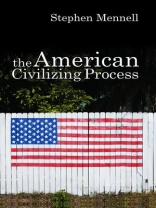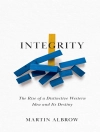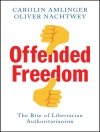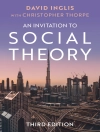Since 9/11, the American government has presumed to speak and act
in the name of ‘civilization’. But isthat how the rest
of the world sees it? And if not, why not?
Stephen Mennell leads up to such contemporary questions through
a careful study of the whole span of American development, from the
first settlers to the American Empire. He takes a novel approach,
analysing the USA’s experience in the light of Norbert
Elias’s theory of civilizing (and decivilizing)
processes.
Drawing comparisons between the USA and other countries of the
world, the topics discussed include:
* * American manners and lifestyles
* * Violence in American society
* * The impact of markets on American social character
* * American expansion, from the frontier to empire
* * The ‘curse of the American Dream’ and increasing
inequality
* * The religiosity of American life
Mennell shows how the long-term experience of Americans has been
of growing more and more powerful in relation to their neighbours.
This has had all-pervasive effects on the way they see themselves,
their perception of the rest of the world, and how the rest of the
world sees them.
Mennell’s compelling and provocative account will appeal
to anyone concerned about America’s role in the world today,
including students and scholars of American politics and
society.
Tabela de Conteúdo
Preface.
Prologue:.
1 ‘American Civilization’.
The Founding Fathers as Philosophes.
‘Progress’ and ‘American
Civilization’.
Fugitive government and ‘American Civilization’.
‘Human nature’ and ‘American
Civilization’.
European absolutism and ‘American Civilization’.
Conclusion.
2 ‘Fellow Americans’ and Outsiders.
Others: the Native Americans.
Others: the Blacks.
Others: the Europeans.
Anti-Americanism: How the outsiders view the established.
Conclusion.
3 American Manners under Scrutiny.
American manners books.
Americans observed.
Technology, hygiene and deference.
Victorianism.
Informalization.
Conclusion.
4 American Aristocracies.
The colonial gentry.
The South: American Junkers?.
The North: Working upper classes.
From cumulative to dispersed inequalities?.
A significant absence: an aristocracy of office.
Conclusion.
5 The Market Society.
The constraints of the market.
The constraints of organization.
Conclusion.
6 Violence and Aggressiveness.
Long-term trends in violence.
Is America peculiarly violent?.
Capital punishment.
Conclusion.
7 And wilderness is paradise enow: From Settlements to
Independence.
Autarky, but not terra nullius.
Population.
Early phases of the American state formation process.
Conclusion.
8 Westward Look the Land is Bright: From Frontier to
Empire.
Manifest destiny and latent dynamics: a necessary theoretical
digression.
The balance between the planned and the unplanned in US
territorial expansion.
‘Sovereignty’ as a function of power ratios.
The Frontier.
Beyond manifest destiny: the beginnings of an American
empire.
Conclusion.
9 Integration Struggles.
Urbanization and resentment of the city.
Immigration.
Growth of the means of ruling.
The breakdown: the Civil War and its aftermath.
A central ambivalence: the armed forces.
Conclusion.
10 The Curse of the American Dream.
Equality and inequality in America.
The American welfare state.
Social mobility in America.
Conclusion: Upwards identification, not mutual
identification?.
11 Involvement, Detachment and American Religiosity.
Fantasy and the growth of knowledge.
American religion in long-term perspective.
Some explanations.
Odd one out – Europe or the USA?.
Conclusion.
12 America and Humanity as a Whole.
‘American Social Character’: Diminishing contrasts,
increasing varieties.
The problem of the American homo clausus: the We-I balance.
Market fundamentalism and diminishing foresight.
Functional de-democratization.
The American Empire.
Conclusion: path dependency in America and the world.
Notes.
Bibliography.
Index
Sobre o autor
Stephen Mennell is Professor of Sociology at University College Dublin.












